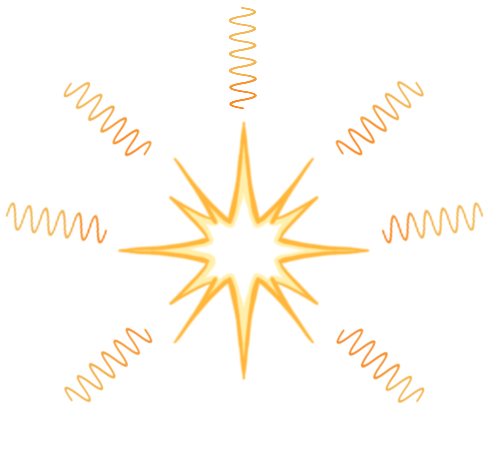Conduction, Convection, & Radiation
This lesson covers:
1How conduction transfers heat
2How convection transfers heat
3How infrared radiation transfers heat
Conduction primarily takes place in:
Liquids
Solids
Space
Gases
|
How conduction works
collide / vibrate / faster / particles / thermal / kinetic
- As one end of a solid object is heated, energy is transferred to the energy stores of the particles in that end.
- This causes the particles to vibrate , and so they with their neighbouring particles more often.
- As the collisions transfer kinetic energy, their neighbours also faster and collide more often with their neighbours.
- This process repeats over and over again so that energy is effectively passed along the object from one particle to the next.
- Even though it's kinetic energy that's being passed between particles, when considering the object as a whole we say that it's heat (or energy) that's being transferred.
We call this overall process of transferring heat energy 'conduction'.
|
Thermal conductivity is a measure of how well a material conducts energy when it is heated.
Which type of materials have a higher thermal conductivity?
Metals
Plastics
|
What do we mean by the term 'fluid', and which states of matter are considered fluids?
|
Convection can take place in:
(Select all that apply)
Gases
Solids
Liquids
|
How convection works
current / heated / less / kinetic / sink
- As a fluid is the particles gain energy and spread further apart.
- This causes the fluid to become dense and so it will rise above any cooler fluid that hasn't been heated (because that fluid is more dense).
- As the fluid cools down it will become more dense again, and so back down.
- If this process takes place in a limited space, like a container or a room, it can create a convection .
|
Which of the following examples help to reduce heat loss via convection :
(You may select more than one)
Closing your windows
Covering yourself with a blanket at night
Making a kettle from plastic rather than metal
|

When we say heat energy is transferred by 'radiation', we are referring to:
None of the above
Ultraviolet radiation
Microwave radiation
Infrared radiation
|
Which of the following statements about infrared radiation is correct?
(Select all that apply)
It is a form of electromagnetic radiation
It involves the movement of molecules due to a change in density
It involves the transfer of electrons through the material
It can travel through a vacuum
|
Do hotter or cooler objects emit more infrared radiation?
Hotter
Cooler
|
Which of the following statements is correct?
Steel conducts heat because their particles rise when heated
Warm fluids rise because they are less dense than cooler fluids
Convection only occurs in gases
|